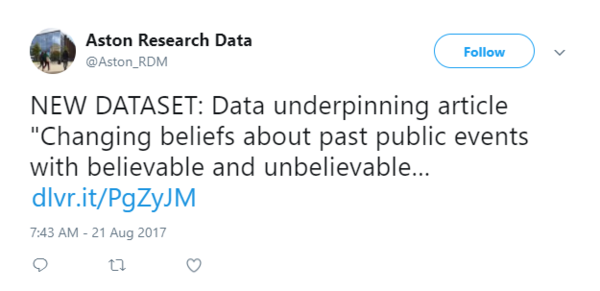Table of Contents
Promoting your data

How can you attract people to use your data and make them as impactful as possible? Consider promoting reuse of your data in one of the following ways:
If you deposit your data in a data repository, choose open access. If researchers can easily access your data, it is more likely that your data will be re-used and have an impact on their work.
Licensing your data is a prerequisite for data impact. If researchers are unclear about what they are allowed to do with your data, they might not use it at all (see 'Licensing your data').
Always cite your data and link your data to scientific publications which are based on this data.
How to cite data: an example
The following dataset which holds data on studying migrations patterns in the Summer Olympics between 1948 and 2012 covers approximately 40,000 athletes and contains information on the country they represented as well as their country of birth. According to the data repository, which holds this open access dataset, it should be cited as:
Reference: Jansen, J. (Erasmus University Rotterdam) (2017): Foreign-born Olympic athletes 1948 - 2012. DANS. https://doi.org/10.17026/dans-2xf-pyqp
Also, see the data citation paragraph in this tour guide.
Consider publishing an article in a peer-reviewed data journal. Data journals are designed to comprehensively document and publish deposited datasets and to facilitate their online exploration. Recommendations for such journals for social sciences and humanities are:
- Research Data Journal for the Humanities and Social Sciences (RDJ, Brill, 2017);
- Journal of Open Psychology Data (JOPD, Ubiquity Press, n.d.a);
- Journal of Open Archaeology Data (JOAD, Ubiquity Press, n.d.b);
- Open Health Data (Ubiquity Press, n.d.c.).
Tip Read this blogpost: Introducing the ‘data paper’ in the Research Data Journal for the Humanities and Social Sciences (Moody, 2017).
Consider preparing a lecture using your datasets (or that of others) and prepare video tutorials on how to use the dataset.
Datasets for training purposes: easySHARE
The Survey of Health, Ageing, and Retirement in Europe (SHARE-ERIC, n.d.) is a multidisciplinary and cross-national panel database of micro data on health, socio-economic status and social and family networks. Surveys are organised bi-annually since 2004. SHARE currently covers 27 European countries and Israel (SHARE-ERIC, 2017).
The SHARE database is easily accessible to the entire research community; data from the SHARE Waves 1 to 6 are available since 2017. A longitudinal data set "easySHARE" (SHARE-ERIC, 2022) has been created especially for training purposes. It contains only selected variables merged into a single data file. It is more user-friendly than the complete set of SHARE panel data.
You can promote your own data. In addition, you can choose a data repository which promotes data for you.
In the tabs below we illustrate some examples of how CESSDA archives promote your data.
After publishing your study in the Catalogue of the ADP (2017b), we invite you to continue cooperating with us and to actively promote your data publication. Some of the possibilities of further cooperation are:
- You may write a short article for our blog (ADP, n.d.) in which you describe your published study and its main findings that would be interesting for the users of your data. We will promote the article through our channels (eNews, social networks, Metina lista website etc.);
- You may write an article for an international scientific journal, specialized for data publication, such as the Research Data Journal for the Humanities and Social Sciences (Brill, 2017);
- Include your data publication in your bibliography (even if your publication did not reach the criteria for a scientific publication, according to the Slovenian Research Agency). By doing so, you expand the possibility of users finding your data.
Through the Catalogue of the ADP, your study will be included in other international catalogues (CESSDA catalogue, OpenAIRE, etc.) and thus available to the larger international community. The ADP will inform you of the use of your research data and will send you notifications of possible publications, based on the use of your data.
| CESSDA Archive |
Promotional activities |
| Czech Republic (CSDA) |
After we publish a dataset, we inform our users via our website in the "News" (CSDA, 2014). |
| Greece (So.Da.Net) |
We publish the new data archived in our newsletter.
|
| Netherlands (DANS) |
DANS promotes datasets in the following ways:
|
| Norway (Sikt) |
Newsletter, Twitter, news items on Sikt’s webpage (Sikt, n.d.b.). |
| Slovenia (ADP) |
Blog, Newsletter, Social media. |
| Switzerland (FORS) |
Three to four times a year we inform our readers about interesting new datasets and important FORS events and activities via our online FORS bulletin. For an example see FORS (2017). |
| United Kingdom (UKDS) |
The four most recently published data are listed on the UKDS homepage as "Latest data" (live feed from the catalogue). |
Altmetrics, or 'alternate metrics', are alternative parameters which measure the impact of your research. More and more, research data and software code are shared in data repositories and quoted in publications. More and more repositories attach a DOI - a persistent identifier - to such datasets, allowing to count how often a dataset:
- Has been cited;
- Has been viewed or downloaded;
- Has been stored in online literature management systems;
- Is listed in online news media or social media.
After you have uploaded your dataset to a data repository which adds DOIs, consider to:
- Write a blog post or an article about your data publication;
- Tweet about it;
- Write about it on Facebook.
- Etc.
Do not forget to always cite your dataset, everywhere (in your publications, in blog posts, in social media, etc.). It is the only way to keep track of how your data is used, viewed, liked. See 'Data citation' for information on how to cite your data.
Tracking data publications
Data publications can be tracked in various ways, as listed by Ball and Duke (2015):
| Citation-based metrics |
Altmetrics-based metrics |
|

|
|
|

